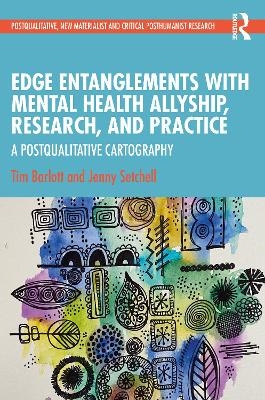
Edge Entanglements with Mental Health Allyship, Research, and Practice
Routledge (Verlag)
978-1-032-26089-1 (ISBN)
Edge Entanglements traverses the borderlands of the community "mental health" sector by "plugging in" to concepts offered by Gilles Deleuze and Felix Guattari along with work from Mad Studies, postcolonial, and feminist scholars. Barlott and Setchell demonstrate what postqualitative inquiry can do, surfacing the transformative potential of freely-given relationships between psychiatrised people and allies in the community.
Thinking with theory, the authors map the composition and generative processes of freely-given, ally relationships. Edge Entanglements surfaces how such relationships can unsettle constraints of the mental health sector and produce creative possibilities for psychiatrised people. Affectionately creating harmonies between theory and empirical "data," the authors sketch ally relationships in ways that move. Allyship is enacted through micropolitical processes of becoming-complicit: ongoing movement towards taking on the struggle of another as your own. Barlott and Setchell’s work offers both conceptual and practical insights into postqualitative experimentation, relationship-oriented mental health practice, and citizen activism that unsettles disciplinary boundaries. Ongoing, disruptive movements on the margins of the mental health sector – such as freely-given relationships – offer opportunities to be otherwise.
Edge Entanglements is for people whose lives and practices are precariously interconnected with the mental health sector and are interested in doing things differently. This book is likely to be useful for novice and established (applied) new material and/or posthumanist scholars interested in postqualitative, theory-driven research; health practitioners seeking alternative or radical approaches to their work; and people interested in citizen advocacy, activism, and community organising in/out of the mental health sector.
Tim Barlott is Assistant Professor in the Department of Occupational Therapy at the University of Alberta, Canada, and Adjunct Fellow and Co-Director of SocioHealthLab at The University of Queensland, Australia. He is interested in participatory, community-based, and applied postqualitative approaches to health research, particularly with psychiatrised people. Jenny Setchell is Senior Research Fellow in physiotherapy at The University of Queensland, Australia and founder of SocioHealthLab, an interdisciplinary collective pursing social transformation in healthcare through sociocultural research. Jenny enjoys using postqualitative and creative research approaches and has also been an acrobat and a human rights worker.
Introduction to the Series
By Simone Fullagar
1. The Edge of Things
2. Destabilising Major Mental Health Approaches
3. Becoming-Minor, Mapping Territories
4. Assembling
5. Doing a Cartography
6. An Entry Point
7. Cartography of Territories
8. Cartography of Becoming
9. Cartography of Desire
10. (Dis)Organising Allyship, Becoming-Complicit
Knots–Sorcery–Belonging, An Afterword
By Lynda Shevellar, Tim Barlott, and Jenny Setchell
| Erscheinungsdatum | 16.12.2022 |
|---|---|
| Reihe/Serie | Postqualitative, New Materialist and Critical Posthumanist Research |
| Zusatzinfo | 1 Tables, black and white; 2 Halftones, black and white; 2 Illustrations, black and white |
| Verlagsort | London |
| Sprache | englisch |
| Maße | 156 x 234 mm |
| Gewicht | 367 g |
| Themenwelt | Medizin / Pharmazie ► Allgemeines / Lexika |
| Medizin / Pharmazie ► Medizinische Fachgebiete ► Psychiatrie / Psychotherapie | |
| Sozialwissenschaften ► Pädagogik ► Erwachsenenbildung | |
| ISBN-10 | 1-032-26089-0 / 1032260890 |
| ISBN-13 | 978-1-032-26089-1 / 9781032260891 |
| Zustand | Neuware |
| Haben Sie eine Frage zum Produkt? |
aus dem Bereich


